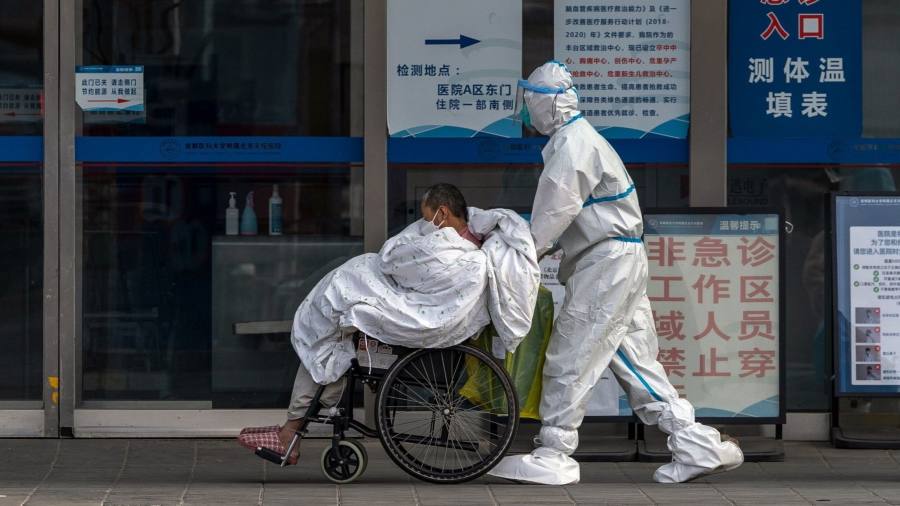
China’s insurance industry has slammed the brakes on selling low-cost policies that cover Covid-19 infections, as it tries to avoid huge payouts and disputes from an oncoming wave of cases caused by Beijing’s relaxation of strict zero-Covid policies.
Waterdrop, the largest third-party online insurance platform in China, this week shelved all policies related to Covid-19, while a popular product offered by China Continent Insurance, paying up to Rmb1,500 ($215) to policyholders testing positive for Covid, is no longer available in search listings.
Similar low-cost Covid policies offered by Alibaba- and Tencent-backed ZhongAn Online P&C Insurance and midsized Yong An Insurance have also been removed from current product offerings.
The moves reflect fears of financial stress ahead. The average solvency ratio of the sector, an important metric of an insurer’s ability to meet its debts, remained at an adequate 212 per cent at the end of September, according to official data. However, the lack of clarity on outstanding liabilities for Covid policies sold is casting a shadow over the sector.
“It’s a prudent act for insurers to take products off the shelf . . . before they can come up with a new form of these products with reasonable pricing,” said Moody’s analyst Kelvin Kwok. “It has been a mega issue for Taiwanese insurers and hit balance sheets hard. Chinese insurers might have observed what has happened there and are moving quickly before confirmed cases go up.”
A rapid rise in infections has forced at least four Thai insurance companies into bankruptcy after suffering losses from overselling low-cost Covid policies. Taiwanese insurers are bracing for more than $1bn in claims, outstripping the revenue they received from premiums this year.
China had only paid out Rmb439mn on Covid-related policies as of mid-May, when infections were relatively under control, according to data from the Insurance Association of China. That represents a tiny fraction of the Rmb27tn in net assets held by China’s insurance industry.
However, the fast exit from zero-Covid policies is changing the risk model for such products, and disputes are expected over dismissals of claims or cancellations of policies.
“There are lots of uncertainties over interpretations of policy terms, and the coverage offered by Chinese insurers is more granular and stringent,” said Kwok, who added that there was a lack of data being disclosed to assess the real impact on insurers.
“I would love to hold a policy that can offer payouts as long as I’m testing positive,” said Bob Min, a self-employed worker in his thirties. “It sounds like an investment with high returns as I’m pretty sure I’ll get it.”
Min is considering a claim for a “quarantine” policy he bought earlier this year from ZhongAn in the event he tested positive. The policy offers subsidies to Covid sufferers. “The terms are unclear so I have a chance to argue for more payouts.”
A local insurance regulator in Beijing said several insurers had successfully sought consent to stop selling certain Covid-related products. “It’s hard for them to stay profitable even with a substantial increase in the premium,” the official said.
The sector’s regulatory body, the China Banking and Insurance Regulatory Commission, did not immediately reply to requests for comment. In a December notice, the Beijing branch of CBIRC urged insurance groups to speed up developing affordable insurance policies to protect people from associated costs related to serious symptoms and deaths from Covid.
“The regulatory directive is that insurers should offer insurance products targeting those areas that might not be sufficiently covered by public funding, but does not necessarily mean that they’re asking insurers to bear a lot of risk on payouts,” Kwok said.
“It’s a commercial decision,” said one senior manager of a midsized insurance company. “We can come back with new policies that specialise more in covering costs from Covid-triggered medical issues or deaths.”
“But with massive infections ahead, there’s no way we can afford countless payouts for those testing positive.”